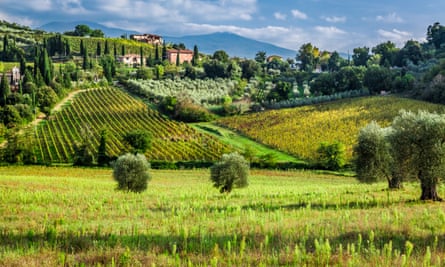Sometimes a book writes back to its author.
When I published Under the Tuscan Sun 20 years ago, I had no idea of its fate. A writer may think her book is the finest thing since Anna Karenina (well maybe not exactly) but it’s impossible to know if your book will sink or soar. My memoir of taking a chance on a rundown villa in the Tuscan countryside quickly began to sell. I hoped it would. How could anyone resist Tuscany?
The book eventually hit the bestseller lists, including the New York Times, where it remained for two and a half years. Now, to my astonishment, people in 50-odd countries have read and still are reading my story.
The first thing the book sent back to me: thousands of faces. At book signings, I connected with readers from Kansas City to Cannes. Through their letters, I became a confidante to strangers who felt like friends. I liked the vulnerable, explicit confessions and desires. I knew walking down the aisle that I didn’t love him enough. And: I would like to be extant in another version. Or: I am giving up law to study cooking in Italy. Even: I have always wanted a blue bicycle. The underlying message always: an acute awareness of choices. How to go forward? How to live? I began to see that something crucial had come through to readers: if I can do it, you can too.
My own decision came from a deep instinct. When I sprang from my comfortable university career into a new life in a foreign country, I took a big risk. Some of the best decisions we make come from that inner voice that says “Why not?” That says “Andiamo.” So much disappointment arises from what is desired but not chosen.

I never regretted plunking down my life savings on the decadent and romantic villa on a hillside overlooking where Hannibal defeated the Romans in 217 BC. I absorbed a new sense of time – slower here, less urgent. When the trucks of people and gear arrived to make the movie of Under the Tuscan Sun, I worried about the disruption it would bring to the community. I needn’t have. The Italians have seen barbarian hordes before. The hijinks of movie-making were rolled right into the everyday life of a piazza that has endured for centuries. Of the gifts that came back to me from writing, an Italian sense of time may be number one.
For these many years, readers have come to visit me at Bramasole, my adopted home in Tuscany. This summer a Hungarian brought me rose cuttings from his grandmother’s garden. Art classes paint in my garden. In early summers here, a mysterious man visited the shrine at the entrance to my garden every day, offering to the Virgin a handful of wild fennel or dog roses. Now he’s gone, but readers leave notes, coins, pinecones, lovely handmade gifts, wine and always flowers. Every time I find a scrawled-on business card, or a packet of dill from Finland, or a photo of a tiny baby left for me, I’m thrilled again. At least one marriage has taken place, between two tourists who started chatting at my gate. I love knowing that people journey in order to see a house. Such a deep metaphor for the self, a house. And one in a foreign country symbolizes so easily a radical leap into a new life.
I was not raised to be the quasi-European I became. I’ve lived in Tuscany longer than anywhere – even the small southern town where I grew up and where my family was once as rooted as the giant magnolia in my grandparents’ yard. Today, Bramasole is my heart’s needle. But a farm in North Carolina claims me, too. (It’s like being in love with two men – sometimes you cannot choose between two loves.) So, where is real home?

My relationship with home first split, then splintered. Having traveled so much to write about places, I’ve had the chance to settle into houses, boats and apartments in Portugal, England, France, Spain, Mexico; to learn to live there, and get my hair cut, attend a church service, eat everything at the market, smell the aromas of stew wafting from my neighbor’s kitchen into mine, keep flowers by the bed. Next spring, I’m renting a house in Puglia with friends. Already, it pulls me. On nights of insomnia, I imagine I’m walking around the kitchen, deciding what I will cook, and where I’ll find a private spot to write about how we live there.
Long after I leave, I know I will return in memory to what Virginia Woolf called “moments of being”. The settling-in kind of travel I prefer gives you those heightened times where you are most alive and feel at home.
I always have loved the suitcase. In my bedroom, the luggage rack is permanently up. Home is that rented white-washed cottage in Crete where the bougainvillea blossoms blew into the hallway. That crazy stone house above Florence, where bats flew around the bed. That stern of a Turkish gulet where 10 of us slept on cushions under the stars. If not for writing, I would not have the chance to feel at home in the world. Before writing Under the Tuscan Sun, I could not have thought this: maybe home is as small as a suitcase.

Comments (…)
Sign in or create your Guardian account to join the discussion